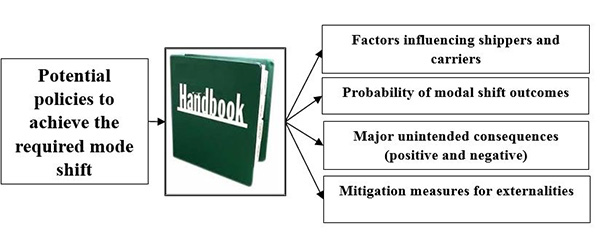United States - European Commission Urban Freight Twinning Initiative: Compendium of Project Summaries, Volume II
Overview of 2018-2019 International Urban Freight Roundtables
| Research | Policy | United States |
Impacts of Policy-Induced Freight Modal Shift
For a variety of reasons, freight mode choice is one of the most complex decision-making processes in transportation. Three economic agents play a role in freight mode choice: shippers, carriers, and receivers. Effective implementation of desired modal shift requires thorough understanding of how these agents respond to various transportation policies. The objective of this research is to develop a handbook for public practitioners that describes the factors freight agents consider for mode choice and provides an analytical methodology for public practitioners to quantify the probability and outcomes of policy-induced modal shifts. Major research tasks include:
- Studying factors influencing current freight modal shares;
- Conducting interviews with freight agents regarding their mode choice decision-making processes;
- Estimating freight mode choice models using the Commodity Flow Survey's 2012 microdata combined with Longitudinal Business Database, modal attribute data comprising of costs, and travel times of various modes;
- Quantification of public impacts of freight modal shifts; and
- Application of models to case studies.
This project is funded by the National Cooperative Freight Research Program (NCFRP) and is being conducted by the Rensselaer Polytechnic Institute (RPI), partnered with Jack Faucett and Associates (JFA).

Major components that will be included in the final handbook for practitioners.
Source: Rensselaer Polytechnic University.
Project Types
Research, Policy.
Period of Performance
October 2013 - October 2018.
Project Sites
The research aims at analyzing the modal shifts patterns at any geographic (national, state, or regional) level.
Contact
José Holguín-Veras
William H. Hart Professor
Rensselaer Polytechnic Institute
Troy, New York, USA
JHV@rpi.edu
(518) 276-2098
Topics Addressed
- Air quality/environment.
- Logistics/distribution.
- Modeling.
Expected Outcomes
The project will result in a handbook that explains the factors shippers and carriers consider when choosing freight mode. These insights will then set up a framework for modeling the outcomes of policy-induced modal shifts. The guidebook and framework are intended to be used by public agencies who are considering enacting policies aimed at shifting mode choices by the freight industry. To do this, it will provide statistical probabilities for modal distribution of a given policy's outcomes and help to anticipate any unintended outcomes of the policy.
Stakeholder Involvement
There are many stakeholders from public and private industry involved in this study:
- Public agencies: NCFRP, Federal Railroad Administration, and the Census Bureau.
- Private agencies: JFA, Caliper Corporation, and private firms that participated in the in-depth interviews.